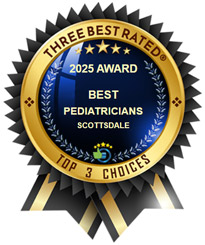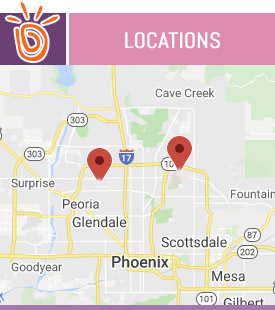Pediatric Diabetes Treatment Specialist in Scottsdale and Glendale, AZ
When your child’s blood sugar, also known as glucose, is excessively high, it is known as pediatric diabetes. The two most typical symptoms of diabetes in toddlers are increased thirst and increased or more frequent urination. Dr. Maria Nabong offers pediatric diabetes treatment at Kidshealth pediatric. Reach out to talk to one of our friendly and experienced staff members today or book an appointment online. We Have 2 Pediatric Clinics in Scottsdale, AZ & Glendale, AZ.




Table of Contents:
How do you know if a child has diabetes?
Why do kids develop diabetes?
What is the life expectancy of a child with diabetes?
What happens when your child is diagnosed with type 1 diabetes?
Welcome to KidsHealth Pediatrics, your trusted Pediatric Diabetes Treatment Specialist in Scottsdale and Glendale, AZ. Our dedicated team of medical professionals specializes in managing and treating pediatric diabetes, a condition increasingly prevalent among children and adolescents. We are committed to providing personalized, high-quality care to each patient, empowering them and their families with the necessary knowledge and tools to manage this condition effectively.
Early detection of diabetes in children is crucial for managing the condition effectively. The signs and symptoms of diabetes in children include excessive thirst and frequent urination. Children may also experience an uncharacteristic increase in hunger, yet suffer from unexplained weight loss. Fatigue is another common symptom as the body’s inability to convert glucose into energy leaves the child feeling consistently tired. Other symptoms might include blurry vision and slow healing of cuts or bruises. It’s critical to consult with a healthcare professional if your child exhibits any of these symptoms, as timely diagnosis can significantly improve the management of the disease.
There are several reasons why children develop diabetes. The most common type, Type 1 diabetes, is usually diagnosed in children and young adults. This form of diabetes is an autoimmune condition where the body’s immune system attacks the insulin-producing cells in the pancreas, which leads to a deficiency in insulin. The exact cause of this immune reaction is still unknown, but it is believed to be a combination of genetic and environmental factors. On the other hand, Type 2 diabetes, which is increasingly being seen in children and adolescents, is usually associated with obesity and a sedentary lifestyle. This type of diabetes occurs when the body develops resistance to insulin or doesn’t produce enough insulin to maintain a normal glucose level. It’s crucial to understand that both types of diabetes are complex and multifactorial diseases that are not caused by eating too much sugar or poor parenting.
With advancements in medical science and technology, children diagnosed with diabetes can expect to live long, fulfilling lives when their condition is effectively managed. A proactive approach to diabetes management—comprising regular glucose monitoring, a balanced diet, physical activity, and medication—significantly improves the quality of life and longevity. It’s important to note that regular follow-ups with healthcare professionals and adherence to prescribed treatment plans can mitigate potential complications associated with diabetes. With the correct care, children with diabetes can grow up to lead healthy, productive lives, comparable in lifespan to those without the condition.
Upon diagnosis of Type 1 diabetes in a child, the immediate focus is on stabilizing the child’s blood glucose levels and providing education about disease management. The child will need to start insulin therapy, which could be multiple daily injections or the use of an insulin pump. They’ll also need to learn how to monitor their blood glucose levels, typically by performing finger-stick blood tests several times a day. The healthcare team will provide guidance on balancing insulin doses with eating and physical activity. Moreover, the child and their family are educated about recognizing and managing potential hypoglycemia (low blood sugar) and hyperglycemia (high blood sugar). Along with medical advice, psychological support is vital to help the child and their family cope with the emotional stress of diagnosis and ongoing management.
Here at KidsHealth Pediatrics, we understand that a diabetes diagnosis can be daunting, but you don’t have to navigate this journey alone. Our dedicated team of specialists is ready to guide and support you every step of the way. If your child exhibits signs of diabetes or requires ongoing medical support, please don’t hesitate. Together, we can ensure your child leads a healthy, happy, and fulfilling life. For more information, please contact us or book an appointment online. We have 2 pediatric clinics in Scottsdale, and Glendale, AZ. We serve patients from Glendale AZ, Peoria AZ, Sun City AZ, Scottsdale AZ, North Scottsdale AZ, Grayhawk AZ, and surrounding areas of Phoenix AZ.

Additional Services You May Need

Additional Services You May Need









